The North American economy could suffer significant economic harm after Canada’s two largest freight railways have come to a full stop over an employment dispute with their workers.
Canadian National Railway (CN) and Canadian Pacific Kansas City (CPKC) locked out more than 9,000 employees Thursday after the companies and union leaders failed to reach a contract agreement, triggering an unprecedented rail stoppage that could cause billions of dollars worth of damage to the supply chain.
All rail traffic in Canada and all shipments crossing the US border have stopped, although CPKC and CN’s trains will continue to operate in the US and Mexico.Â
Billions of dollars of goods are transported between Canada and the US via rail each month. Experts warn a prolonged strike could disrupt a wide range of goods across multiple sectors, including agriculture, construction and the auto industry.
Business groups had urged the Canadian government to intervene, but Prime Minister Justin Trudeau has declined to force both sides into arbitration yet.Â

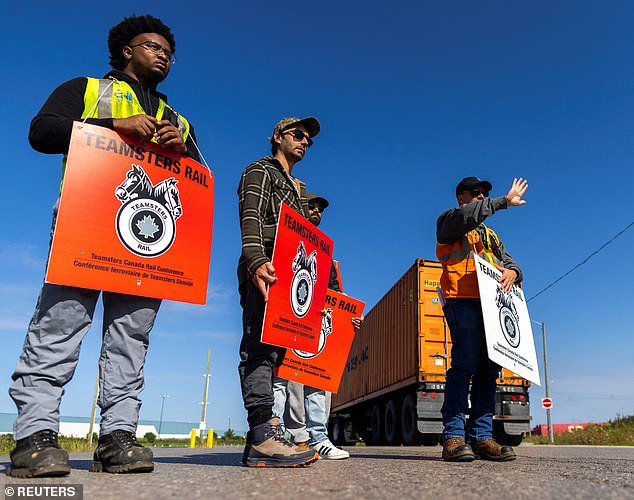
Canadian National Railway (CN) and Canadian Pacific Kansas City (CPKC) locked out more than 9,000 employees Thursday after the companies and union leaders failed to reach a contract agreement. Pictured: CPKC workers on the picket line today in Vaughan yard, Toronto
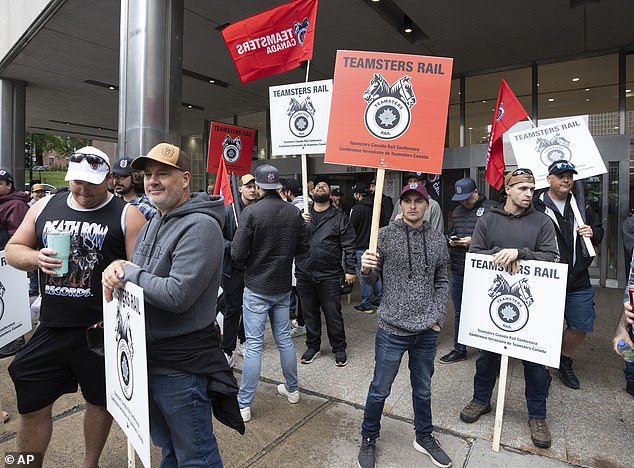
All rail traffic in Canada and all shipments crossing the US border have stopped, although CPKC and CN’s trains will continue to operate in the US and Mexico. Pictured: Rail workers picket in front of CN headquarters in Montreal today
Industry leaders and business groups have sounded alarm over the stoppage, which they say will raise costs and lead to ‘devastating consequences’.Â
Ratings agency Moody’s has warned that the stoppage could cost over $251million ($341million CAD) per day.Â
The stoppage is set to cripple shipments of grain, potash and coal while also slowing the transport of petroleum products, chemicals and autos.
Businesses in the US are set to be impacted as well, as the two economies are highly integrated. Companies across all industries rely on railroads to deliver their raw materials and finished products, so without regular rail service they may have to cut back or even close.Â
Rail transport accounted for 14 per cent of total bilateral trade of $382.4billion in the first half of the year, according to the US Department of Transportation.
Kate Yates, Director Digital Marketing, Communications and Public Relations at Crane Worldwide Logistics in Houston, told DailyMail.com in a statement that industry experts ‘expect supply chain operations to be heavily disrupted with the lack of rail freight services’.
‘Whilst trucking services and transloading capabilities can support in the short term, rail distribution is a vital component of the Canadian economy. The impact of the disruption will be dependent upon the time it takes for all parties to come to a resolution,’ Yates warned.Â
Tens of thousands of people who depend on certain commuter rail lines into the cities of Toronto, Vancouver and Montreal, have also been impacted by the lockouts, as all train movement on these CPKC-owned lines has been halted.
‘The rail shutdown at CN and CPKC is already costing workers, transit users and businesses across the country, and we cannot afford to let things get worse,’ Ontario Premier Doug Ford said Thursday in a post on social media platform X.
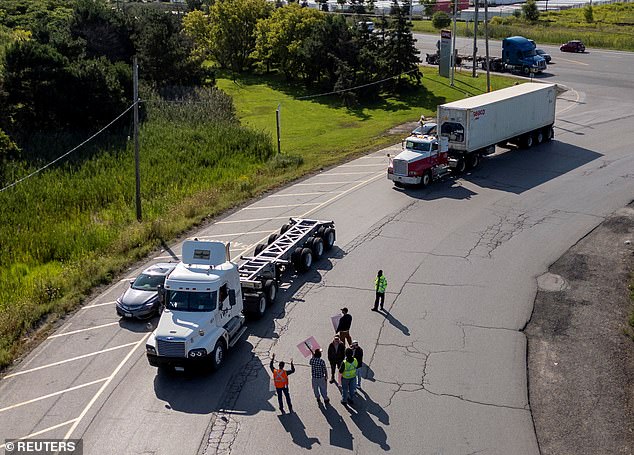
Locked out CPKC workers are seen stopping trucks for five minutes today before letting them enter the CPKC Vaughan yard, near Toronto
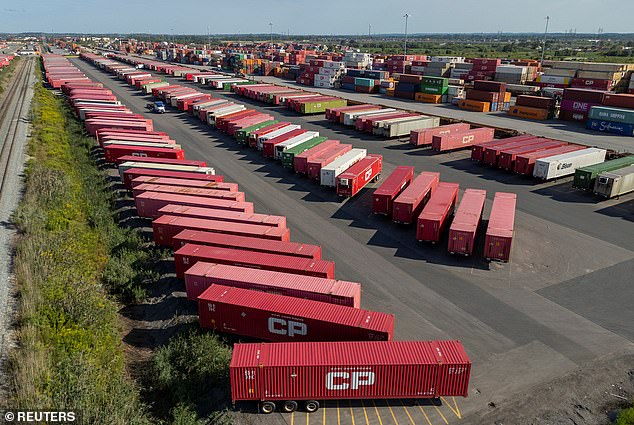
Containers stacked at the CPKC Vaughan yard, near Toronto, today after Canadian National Railway (CN) and Canadian Pacific Kansas City (CPKC) locked out workers following unsuccessful negotiation attempts
Both CN and CPKC locked out their employees after the 12.01am deadline passed on Thursday morning after failing to reach new agreements with the Teamsters Canada Rail Conference (TCRC) that represents some 10,000 engineers, conductors and dispatchers.Â
The companies and the Teamsters union blamed each other for the work stoppage after multiple rounds of talks failed to yield a new agreement.
‘Throughout this process, CN and CPKC have shown themselves willing to compromise rail safety and tear families apart to earn an extra buck,’ TCRC president Paul Boucher said.
The union, in a statement Thursday, added:Â ‘Despite the lockout, the Teamsters remain at the bargaining table with both companies.’
The two railroads said they had bargained in good faith and had made multiple offers with better pay and working conditions.
CN said it was waiting for a response on one final offer made late Wednesday when it locked the workers out.Â
‘Despite our best efforts, it is clear that a negotiated outcome with the TCRC is not within reach,’ CPKC said. Spokesperson Patrick Waldron also said the union rejected its last offer that CEO Keith Creel made at the table in person.Â
Both railroads have stated that they would end the lockout if the union agreed to binding arbitration.Â
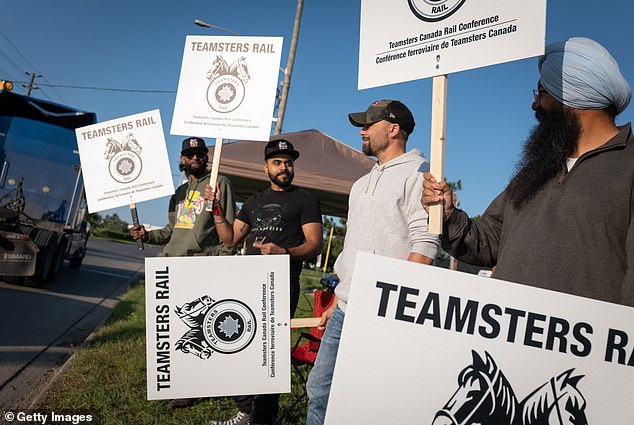
Locked out railway workers outside of the CN Rail Brampton yard on August 22, 2024 in Brampton, Ontario
The Canadian government has so far asked the railroads and the union to work together and reach an agreement, choosing not to use its power to refer the dispute to binding arbitration.
Trudeau has been reluctant to force arbitration because he doesn’t want to offend the TCRC and other unions, but ahead of the shutdown had urged both sides to reach a deal, warning of the tremendous economic damage that could follow.
‘It is in the best interest of both sides to continue doing the hard work at the table,’ Trudeau said to reporters in Gatineau, Quebec on Wednesday. ‘Millions of Canadians, workers, farmers, businesses, right across the country, are counting on both sides to do the work and get to a resolution.’
Numerous business groups have been urging Trudeau to act.
Trudeau said Labor Minister Steven MacKinnon met with both sides in the CN talks in Montreal on Tuesday and would be on hand for the CPKC talks in Calgary, Alberta. MacKinnon later said he wrapped up his meetings with the rail companies and the Teamsters.
Francois Laporte, president of Teamsters Canada, told reporters outside CN’s Montreal headquarters that he did not expect the government would force workers into arbitration.
‘We believe that this thing has to be settled at (the) bargaining table,’ Laporte said Thursday in front of picketing CN workers. ‘We don’t believe in letting a third party decide what’s going to be the working conditions of these people.’
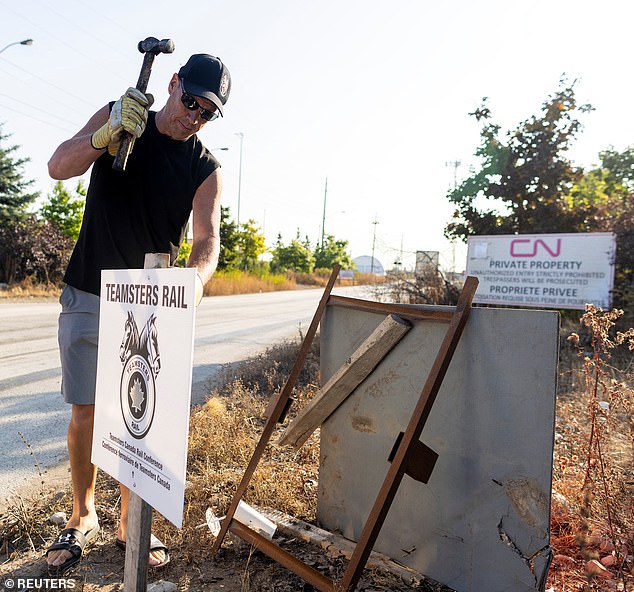
A CN employee hammers a sign into place at the CN MacMillan Yard in Vaughan, near Toronto, after Canadian National Railway (CN) and Canadian Pacific Kansas City (CPKC) locked out workers today
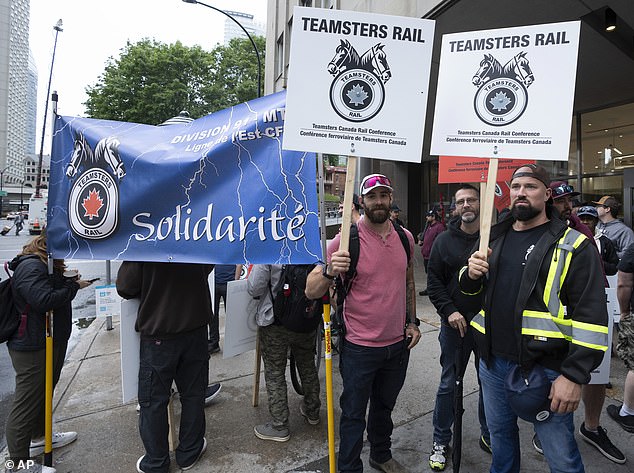
Rail workers picket in front of CN headquarters on the first day of a nationwide rail shutdown
CN had been negotiating with the Teamsters for nine months while CPKC had been trying to reach an agreement for a year, the unions said.Â
The work strike that has thousands of workers off the job across Canada is largely rooted in scheduling, availability of labor, and demands for better work-life balance, according to the union and company statements.
The negotiations are stuck on issues related to the way rail workers are scheduled and concerns about rules designed to prevent fatigue and provide adequate rest to train crews.Â
Both railroads had proposed shifting away from the existing system, which pays workers based on the miles in a trip, to an hourly system they said would make it easier to provide predictable time off.
CN locomotive engineers on the picket line said they are concerned about longer work shifts and an effort by the companies to cut a current rest period of 24 hours after returning home roughly in half.
They said most younger workers at CN work on call and have to jump to assignments, packing days worth of food for the road, on two hours’ notice.
‘What we want are working conditions that will make sure that the train operator, whether it is an engineer or conductor … gets their proper rest,’ Laporte said.
The railroads said their contract offers have included raises consistent with recent deals in the industry. Engineers make about $150,000 a year on Canadian National while conductors earn $120,000, and CPKC says its wages are comparable.
The Canadian government introduced new duty and rest period rules in 2023.
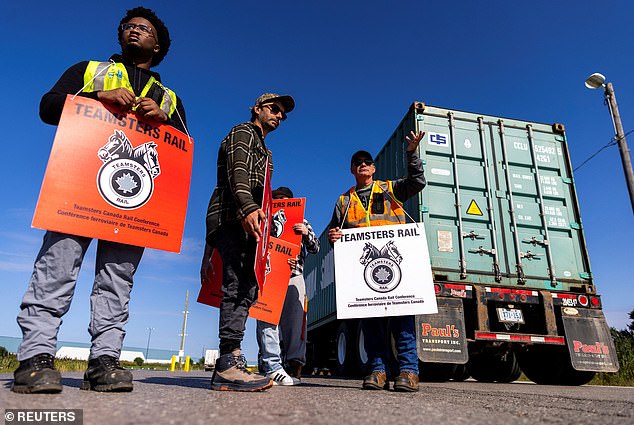
Locked out CPKC workers are seen on the picket line today in Vaughan, Ontario, Canada following unsuccessful contract negotiations
Both CN and CPKC had been gradually shutting down since last week ahead of the contract deadline. Shipments of hazardous chemicals and perishable goods were the first to stop, so they wouldn’t be stranded somewhere on the tracks.
As the Canadian contract talks were coming down to the wire, one of the biggest US railroads, CSX, broke with the US freight rail industry’s longstanding practice of negotiating jointly for years with the unions.Â
CSX reached a deal with several of its 13 unions that cover 25 per cent of its workers ahead of the start of national bargaining later this year.
The new five-year contracts will provide 17.5 per cent raises, better benefits and vacation time if they are ratified.
The unions that have signed deals with CSX include part of the SMART-TD union representing conductors in one region, the Transportation Communications Union (TCU), the Brotherhood of Railway Carmen and the Transport Workers Union.Â
TCU President Artie Maratea said he’s proud that his union reached a deal ‘without years of unnecessary delay and stall tactics.’
Source link : http://www.bing.com/news/apiclick.aspx?ref=FexRss&aid=&tid=66cb55be9b514902ae06428d936edb53&url=https%3A%2F%2Fwww.dailymail.co.uk%2Fnews%2Farticle-13769307%2FCanada-rail-strikes-threatens-America-economy-supply-chain.html&c=2675805071412310923&mkt=en-us
Author :
Publish date : 2024-08-22 04:45:00
Copyright for syndicated content belongs to the linked Source.












